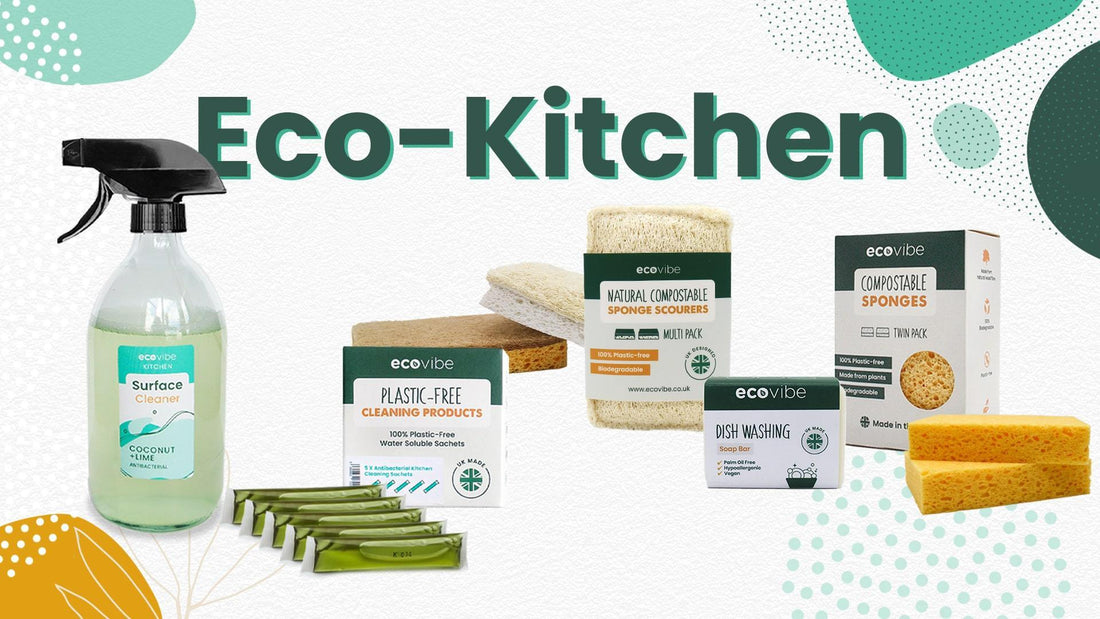When it comes to creating an eco-friendly home, one of the best places to start is in the kitchen. A hub of the home, the kitchen is a place where many products that impact the environment are kept, and a lot of time can also be spent cleaning the kitchen with items that are detrimental to the ecosystem.
We’ve come up with a list of top tips for creating an eco-friendly kitchen so you can do your part for the environment!
1. Take stock of your kitchen inventory
A good place to start is to think about what items you’re keeping in your kitchen, from cutlery to cleaning products. What are these items made of? What are the impacts of these materials? Could it be of benefit to replace them?
Asking yourself these questions will help you be selective in your kitchen audit and devote your time to the right priorities.
2. Swap out your cleaning products for sustainable items
Everyday kitchen cleaners contain a wide range of chemicals that negatively impact the environment, such as ammonia, chlorine, triclosan and more.
A good tip is to swap out these kinds of products for eco-friendly kitchen cleaners that are made from sustainable materials. For example, our plastic-free kitchen cleaner set can tackle all kinds of spillages and stains, while also helping to reduce your carbon footprint.
Another product we’d recommend is our compostable sponges that are made from plant cellulose and can be recycled.
3. Introduce a recycling bin
The kitchen is a source of a high volume of food waste, and you can create a more sustainable atmosphere with a recycling bin. You could even label the bin as a reminder to keep yourself accountable for the specific waste that’s going to be put inside.
Our biodegradable bin liners are a great option to use with a recycling bin. Plastic free and durable, the bin liners are compostable and work with pedal and indoor swing bins.
4. Use environmentally friendly eating utensils
Another tip for creating an eco-friendly kitchen is to introduce eating utensils that are made from alternative materials.
A good example is our bamboo knife, fork and spoon set. Bamboo is a great alternative to plastic and metal and our utensil set is strong, sturdy and dishwasher safe.
Another advantage of bamboo products is that they are naturally anti-bacterial and don’t need any toxic chemical treatments. This is due to a substance called bamboo kun, which is found in bamboo fibre and prevents harmful microbes from growing on the products.
5. Focus on zero-waste meals and sustainable food products
When it comes to cooking, it’s worth thinking about how you can make smarter decisions with your food and make the most of ingredients. This might involve turning leftover food waste into another meal, preserving food in the fridge or only buying what you need on a grocery shopping trip.
The type of food you buy also impacts the environment and we offer an extensive range of sustainable food items at Ecovibe.
6. Always utilise reusable packaging
From the containers that you use to store food in the kitchen, to bags that are used for transporting waste, we’d recommend using packaging that is made from long-lived, sustainable materials.
One of our favourite reusable kitchen products is this glass mason jar that’s great for preserving food. It’s recyclable, plastic free and easily cleaned, allowing it to be used multiple times.
Final words
We’d love to hear your tips for an eco-friendly kitchen, so let us know in the comments below!

